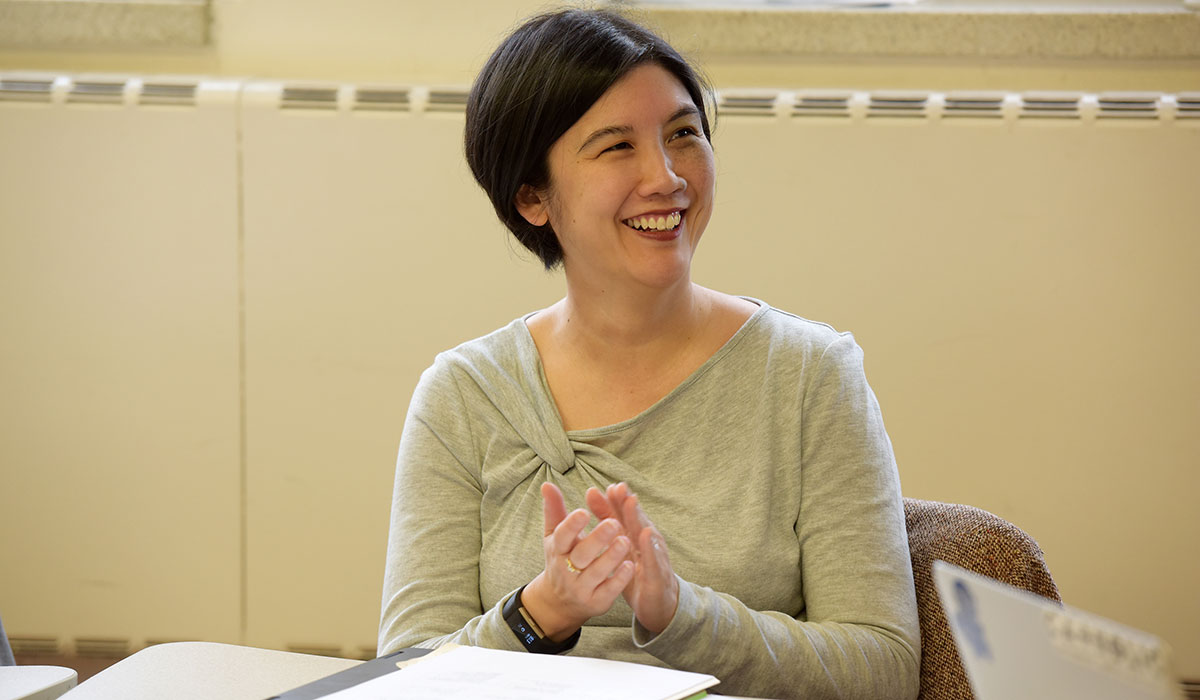

As a girl growing up in San Diego, Taryn Okuma liked reading Sherlock Holmes mysteries and suspenseful novels by the likes of Agatha Christie.
“I’ve been a kind of Anglophile for as long as I’ve loved literature,” says Okuma, associate professor of practice and director of placement in the Department of English. “I’ve definitely preferred British authors.”
Contemporary British literature is one of the subjects Okuma has taught since joining the University faculty in 2009, introducing students to the work of writers ranging from Henry Green to Salman Rushdie. But the mystery she’s most dedicated to solving these days may be helping students uncover the secrets of how to improve their writing. A primary area of her expertise is composition and pedagogy.
“It’s not enough to love talking about literature — I’m also very interested in helping students to tell their own stories,” Okuma says. “And those stories might be academic stories; they might be research projects; but they might also be things like life writing in the memoir class. I’ve become more interested in writing the longer that I’ve been teaching, because I’ve seen it as a way to connect with students across the University.”
As a graduate student at the University of Wisconsin, Okuma discovered the joys of helping other students learn to express themselves more effectively on the page. When she came to Catholic University, she found the Writing Center tucked away in O’Boyle Hall in an unmarked room, operating with relatively little publicity. She has been active in raising its profile ever since.
“The English Department was happy to let me try to professionalize the training program for the graduate students,” Okuma says, “and kind of streamline the operations. Eventually, I started the undergraduate peer tutor program.”
That program has turned out to be very popular, especially among undergraduates who are interested in teaching or in graduate school. Students receive training in the theory and practice of the Writing Center as well as rhetoric and composition theory.
Okuma mentors peer tutors in developing individual research projects. Every year since the program started, students have presented their research at professional conferences nationally and internationally.
The literature of war and terror is another area of Okuma’s expertise. She is especially interested in the ways novelists have represented life in wartime since the terror attacks of 9/11.
“Already in the 20th century, the notion of what warfare is, and who is a combatant and who is a noncombatant, had changed,” Okuma says. “But the ‘War on Terror’ makes these questions a lot more complicated. I’ve been interested in the ways that novels like Jonathan Safran Foer’s Extremely Loud and Incredibly Close, or Don DeLillo’s Falling Man, take this on.”
Her interest in war literature, Okuma believes, may have developed as a response to her family history. Several of her ancestors were detained in internment camps such as Manzanar and Tule Lake during World War II.
From that starting point, she moved “sideways,” as she puts it, to the British literature of World War II. She became preoccupied by the ways history is narrated when people tell stories about what has happened to them.
“I was interested in accounts of the war that were told from the margins, about noncombatants,” she says. Her fascination with such issues encouraged Okuma to explore the art of memoir. She has developed a course on the genre.
“The reason why I’m so interested in memoir as a genre is that it is bound up with so many of the kind of ethical questions about narrative that I find interesting,” she says. “The question for me with narrative is: To what extent is telling my story also telling the stories of others?”
Seizing another opportunity to help students develop as writers, Okuma founded Inventio, a journal of student research. Two of her colleagues, Jennifer Paxton and Caroline Sherman, both in the Department of History, joined her as faculty editors, but students are responsible for the journal’s writing and the bulk of the editing.
“We’re now in our fifth year,” Okuma says. “Students copy-edit the entire journal, and something that’s been really delightful in the last couple of years is that I’ve had people reach out to me to ask if there are any of our former or current copy editors who might be interested in some professional copy-editing jobs.”
Finding ways to give students opportunities to write and publish keeps Okuma busy. With that as one of her goals, she started the English Department’s newsletter, which features essays by students as well as interviews and news about events.
During her first three years on campus, Okuma lived in Regan Hall with her husband and first child as part of the faculty-in-residence program. She hosted a biweekly tea in their apartment, and spearheaded trips to see operas and Shakespeare plays.
“I got to know what great babysitters our students are!” she says. “They were great around my son, who was two years old when we moved in. They’re part of the reason why he wants to come here when he goes to college.”
He now has four younger brothers. Following in his footsteps, they all hope to enroll at Catholic University some day.
— Greg Varner, Senior Writer and Editor. He can be reached at varnerg@cua.edu.